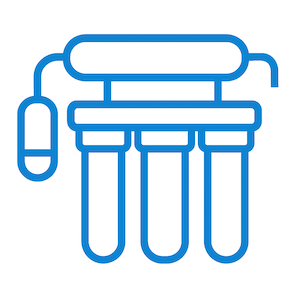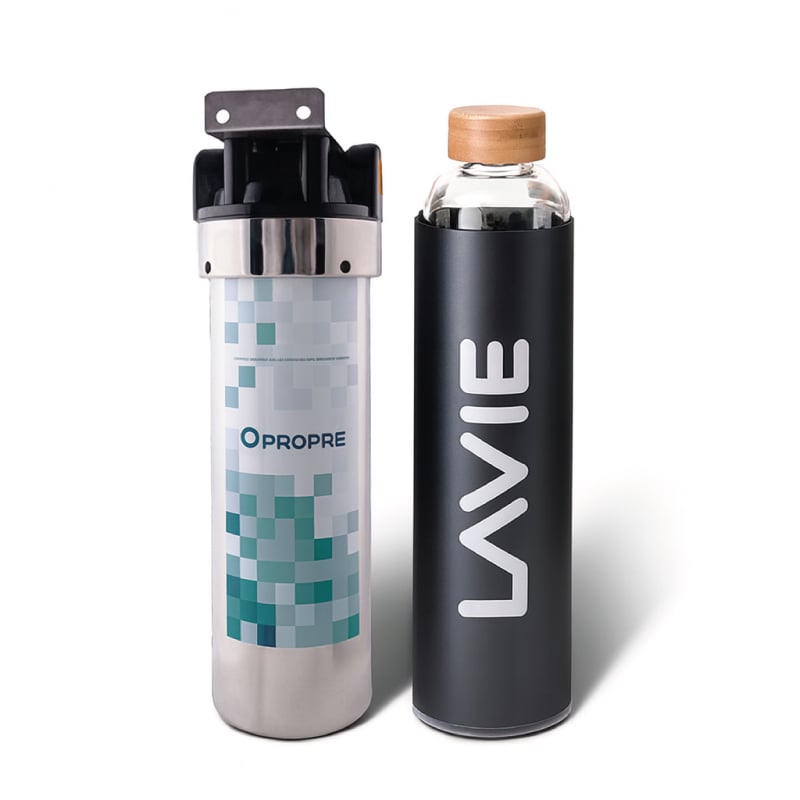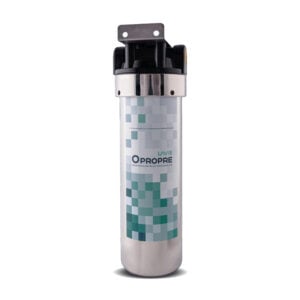
30-day money-back guarantee *
30-day money-back guarantee *

They are invisible and odourless, but they are very much present in our drinks. PFAS, also known as eternal pollutants, are hazardous chemical substances that are now found in our piped water. Their existence has been confirmed in many towns and cities, and the health authorities are becoming increasingly concerned.
A recent example: in July 2025, twelve towns in the Ardennes have banned the consumption of tap water because of excessively high levels of PFAS, suspected of having serious health effects.
Faced with this silent threat, reverse osmosis is presented as the ideal technology for drinking purer water. But is it really the best option for everyday use? Well, no! Because while this technology is effective, it has a number of limitations.
Are you looking for a long-lasting, reassuring solution for your health and that of your family? In this article, we'll help you find out more about using a osmosis unit for tap water and we offer you alternatives that are just as effective, but much more responsible, such as Opropre Turquoise filter de LAVIE.
PFASs, per- and polyfluoroalkylated substances, are toxic chemical compounds that have been used on a massive scale for over 70 years in everyday products: non-stick frying pans, waterproof textiles, food packaging, fire-fighting foams, etc. Unfortunately, these eternal pollutants are found everywhere in our environment: in the soil, in groundwater and in tap water.
That's why, on 30 July 2025, the Ministry of Ecology published a map showing the presence of PFAS in water in France. 39 sampling points exceed the regulatory thresholds in drinking water. And that's just the tip of the iceberg: there are several thousand varieties of PFAS, but only 20 are monitored under the current European directive.
And that's not all! Some are now classified as carcinogenic or possible carcinogens. Over time, they can also disrupt the hormonal system, affecting fertility, the liver and other vital organs.
However, most conventional filtration solutions such as filter carafes are not effective against PFAS. Only more effective technologies, such as reverse osmosis or specialised filters like Opropre Turquoise, can really eliminate them from your water. Let's take a closer look at their PFAS treatment power.
💧 Read also : Carafe filter: Is it effective against PFAS?
L'reverse osmosis is one of the most effective solutions for removing PFAS (persistent pollutants) from tap water. This technology is based on a highly advanced process: the water is forced at high pressure through a membrane made up of several layers, capable of retaining virtually all undesirable substances.
Result: the osmosis unit removes up to 99 % of contaminants, such as nitrates, pesticides, heavy metals, drug residues, chlorine, bacteria, viruses and, of course, PFAS and TFA.
It is a filtration system renowned for its performance, used in industry as well as in some homes.
But despite its effectiveness, this water treatment is not without consequences for your health and the environment. We explain why.
Despite its effectiveness against PFAS, theReverse osmosis has a number of disadvantages that make this process unsuitable for everyday use, see dangerous for your health and for the environment.
So, what solutions can you envisage to eliminate PFAS from your water effectively, without compromising your health or the planet?
💧 Read also : Does reverse osmosis make water unsafe to drink?
Carafe filters, reverse osmosis systems, tap filters... It's not always easy to find your way around when you're looking for quality drinking water. To help you make the right choice, here's a clear comparison of the main water filters. filtration solutions and their effectiveness against PFAS, the so-called eternal pollutants, and other contaminants.
|
Element filtered, reduced or eliminated |
Classic carafe filter |
Tap filter |

Osmosis unit |

Opropre under-sink filter |

Peace of mind pack (Opropre + LAVIE PURE) |
| Chlorine | ✅ | ✅ | ✅ | ✅ | ✅ |
| Sediment | ✅ | 🟠 | ✅ | ✅ | ✅ |
| Bacteria | ❌ | ❌ | ❌ | ❌ | ✅ |
| Virus | ❌ | ❌ | ❌ | ❌ | ✅ |
| Medicines | ❌ | ❌ | ✅ | ✅ | ✅ |
| Heavy metals | 🟠 | 🟠 | ✅ | ✅ | ✅ |
| Pesticides | ❌ | ❌ | ✅ | ✅ | ✅ |
| PFAS | ❌ | ❌ | ✅ | ✅ | ✅ |
| Microplastics | ❌ | ❌ | ✅ | ✅ | ✅ |
| Mineral conservation beneficial |
❌ | 🟠 | ❌ | ✅ | ✅ |
| Discover | Discover |
Opropre Turquoise pushes back the limits of tap water filtration in the home. Developed by LAVIE, this new generation under-sink filter eliminates the most stubborn pollutants, including PFAS, without the drawbacks of reverse osmosis.
The secret? A combination of high quality activated coconut carbon and a specific ion exchange resin. Together, they effectively filter chlorine, heavy metals, pesticides, microplastics and nanoplastics from drinking water, while preserving essential minerals such as calcium and magnesium, and without chemicals. The result is healthy, balanced water that's great to drink, day after day.
And its performance on PFAS is scientifically proven. A independent study conducted by the Environmental Chemistry Laboratory at Aix-Marseille University showed that the filter can retain up to 27.4 mg of PFOA and 23.8 mg of PFBA per gram of resin. These quantities represent twice the PFAS rate measured in the most concentrated point in France over six months (for tap water use: drinking + cooking + washing up in a 4-person household). A very high level result, rare in domestic use.
Another advantage of this water treatment system is its sustainable design. LAVIE cartridges are returnable for refilling. The carbon and anti-PFAS resin are then recycled in specialised industrial circuits. No unnecessary plastic waste is produced.
And to finish on a high note: easy to install, with no water discharge, no electricity and no compromises, Opropre Turquoise is THE reliable, long-lasting and safe filtration solution against PFAS.

With growing mistrust of tap water and its contaminants, many people are turning to bottled water. And yet.., this alternative is far from ideal compared with other technologies.
From a health point of view, a number of analyses have revealed the following the presence of microplastics in bottles from leading brands. And contrary to popular belief, PFAS were also detected. So drinking bottled water is not synonymous with purity - quite the contrary.
On the practical and economic side, bottled water involves a substantial budget over the long term, as well as being cumbersome to transport and store.
And what about its dramatic ecological impact? Every year, billions of plastic bottles end up in the bin, and only a minority are actually recycled. As a result, tonnes of waste accumulate in the environment, adding to an already alarming level of pollution.
That's why bottled water is no better for your health. It's better to opt for high-performance, long-lasting filtration, such as Opropre Turquoise.
Reverse osmosis is certainly effective against the PFAS present in tap water, but at what price? Elimination of essential minerals, waste of water, high cost, ecological impact... This technology is neither suitable for everyday use nor beneficial to your health and that of the planet.
Fortunately, there is an alternative: Opropre Turquoise. This under-sink filter combines high performance, respect for the environment and ease of use. It eliminates PFAS from your water while preserving essential mineralswithout discharging polluted water or producing plastic waste. Our aim? To offer you drinking water that is healthy, tasty, balanced and beneficial.
For safe, responsible and sustainable hydration, Opropre Turquoise is the ideal choice.
Yes, but not with just any treatment. Conventional jug filters or tap filters are ineffective. LAVIE's Opropre Turquoise under-sink filter, on the other hand, is capable of removing PFAS from drinking water thanks to a combination of activated carbon and ion exchange resin. A high-performance, long-lasting solution with no compromise on water quality.
Yes, reverse osmosis can filter PFAS efficiently thanks to its very thin membrane. But this treatment has a number of drawbacks: acid and demineralised water, wastage, complex and costly maintenance, etc. For everyday use, it's better to opt for a healthier, longer-lasting alternative with Opropre Turquoise and its activated carbon and resin, which eliminate PFAS without harming your health or the environment.
No. Osmosis water is demineralised: it no longer contains calcium, magnesium or potassium, all of which are essential to the body's equilibrium. Over time, this acidified water weakens the body and disrupts the proper functioning of the metabolism. For truly healthy and beneficial hydration, opt for a system that preserves these necessary minerals in your drinking water, like Opropre Turquoise.
Want to keep up to date with our water-related articles?
Subscribe to our Newsletter below
and get -5% on your first order!
Lost your password? Please enter your login or your e-mail address. You will receive a link by e-mail to create a new password.